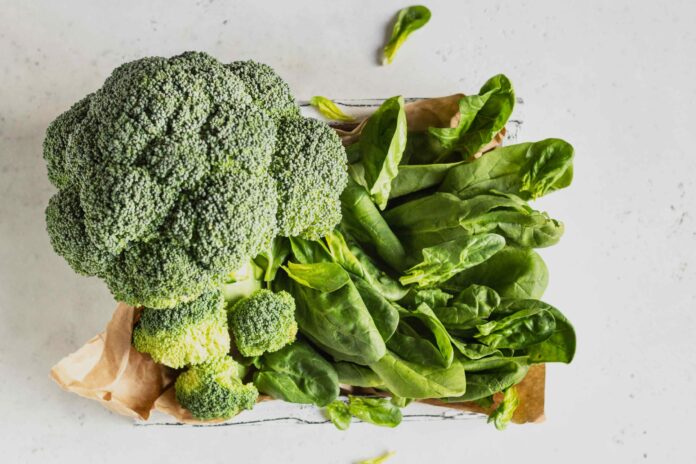For a healthy lifestyle, incorporating a variety of colorful vegetables into your diet is essential. Beyond their vibrant hues, these plant powerhouses offer a treasure trove of fiber, vitamins, antioxidants, and other vital nutrients that support overall well-being. Here’s a look at eight nutrient-rich vegetables that deserve a starring role on your plate:
1. Broccoli: The Immunity Booster
Broccoli’s versatility shines in the kitchen; it can be enjoyed raw for crunch, steamed for tenderness, or roasted to caramelized perfection. But beyond its culinary appeal lies a nutritional powerhouse packed with vitamins A and C – essential for bolstering immunity and protecting your skin from damage. Adding broccoli to your diet also means you’re increasing your intake of calcium for strong bones and vitamin K, crucial for healthy blood clotting.
- Per cup (76 grams) of raw broccoli:
- Calories: 24
- Fiber: 2 grams
- Vitamin C: 69 mg (77% of the daily value)
- Vitamin K: 78 mcg (65% of the daily value)
2. Spinach: More Than Just Popeye’s Powerhouse
Spinach deserves a place at every meal thanks to its incredible nutrient density. One cup of raw baby spinach delivers nearly half your recommended daily intake of vitamin C, plus it’s incredibly hydrating and low in calories, making it a valuable ally for weight management. This leafy green is brimming with an array of vitamins, minerals, and antioxidants that fight inflammation, support brain health, protect vision, and promote heart health.
- Per half cup (about 100 grams) of cooked baby spinach:
- Calories: 27
- Fiber: 1.6 grams
- Vitamin C: 27 mg (45% of the daily value)
- Vitamin B6: 0.2 mg (12% of the daily value)
3. Kale: The Sturdy Superfood
Don’t let kale’s sturdy, dark green leaves fool you – this powerhouse packs a serious nutritional punch. It boasts vitamins C and E along with an abundance of antioxidants, which combat inflammation and shield cells from damage, potentially lowering your risk for certain cancers.
- Per cup (20.6 grams) of raw kale:
- Calories: 7
- Fiber: 0.9 grams
- Vitamin C: 19 mg (21% of the daily value)
4. Mustard Greens: A Peppery Punch for Your Health
Mustard greens bring a bold, peppery flavor to salads and stir-fries, making them a delicious addition to dishes featuring naturally sweet root vegetables like beets or sweet potatoes. Low in calories yet high in nutrients, these leafy greens are brimming with vitamins A and C – essential for boosting immunity and keeping your energy levels up.
- Per cup (56 grams) of mustard greens:
- Calories: 15
- Fiber: 1.8 grams
- Vitamin C: 39 mg (43% of the daily value)
- Vitamin A: 85 mcg (9% of the daily value)
5. Arugula: The Delicate but Mighty Green
Beneath its delicate, small leaves lies an unexpected nutritional powerhouse. Arugula is a good source of vitamins A, C, and K – vital for bone health, eye function, and blood clotting – making it more than just a pretty garnish. It also contains folate, crucial for brain health.
- Per five cups (100 grams) of arugula:
- Calories: 26
- Fiber: 2 grams
- Vitamin C: 101 mg (112% of the daily value)
- Folate: 149 mcg (37% of the daily value)
6. Swiss Chard: A Rainbow on Your Plate
Like other dark leafy greens, chard is packed with antioxidants and boasts anti-inflammatory properties. Research suggests that these compounds can benefit blood sugar regulation and contribute to cardiovascular health.
- Per cup (36 grams) of Swiss chard:
- Calories: 7
- Fiber: 0.6 grams
- Vitamin C: 11 mg (12% of the daily value)
- Vitamin A: 110 mcg (12% of the daily value)
7. Cabbage: Beyond the Comfort Food Staple
Cabbage has long been recognized for its potential to soothe digestive discomfort and alleviate conditions like irritable bowel syndrome (IBS). But recent studies suggest that cabbage’s unique nutrient profile – rich in antioxidants, protein, and vitamins C and E – may offer even greater benefits. Research indicates it could play a role in cancer prevention, liver protection, and cholesterol management.
- Per one and a quarter cups (100 grams) of raw cabbage:
- Calories: 28
- Fiber: –g (This value is often missing in nutritional databases for cabbage)
- Vitamin C: 40 mg (44% of the daily value)
- Vitamin K: 59 mcg (49% of the daily value)
8. Beet Greens: The Often-Overlooked Treasure
Don’t discard those leafy beet greens! They can be sauteed, added to soups, or tossed into salads for a nutritional boost and an exciting flavor dimension. Low in calories, high in water content, and brimming with vitamin C and other antioxidants, these often-overlooked greens are a valuable addition to any meal plan. Recent research suggests that dehydrated beet greens may contain even more protein than spinach – potentially up to 30 grams per 100 grams!
- Per cup (38 grams) of beet greens:
- Calories: 8
- Fiber: 1.4 grams
- Vitamin C: 11.4 mg (45% of the daily value)
Choosing Wisely for Maximum Benefit
To truly maximize the flavor and nutritional benefits of your vegetables, choose wisely and cook them with care. Look for vibrant colors, firm textures, and avoid wilted or damaged leaves. Experiment with different cooking methods to discover your favorites – from quick stir-fries to slow roasted perfection – and enjoy!






















